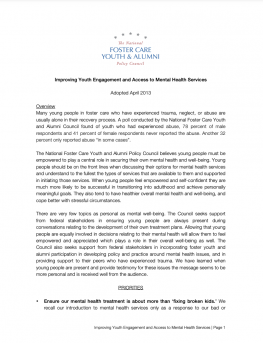
Many young people in foster care who have experienced trauma, neglect, or abuse are usually alone in their recovery process. A poll conducted by the National Foster Care Youth and Alumni Council found of youth who had experienced abuse, 78 percent of male respondents and 41 percent of female respondents never reported the abuse. Another 32 percent only reported abuse “in some cases”.
The National Foster Care Youth and Alumni Policy Council believes young people must be empowered to play a central role in securing their own mental health and well-being. Young people should be on the front lines when discussing their options for mental health services and understand to the fullest the types of services that are available to them and supported in initiating those services. When young people feel empowered and self-confident they are much more likely to be successful in transitioning into adulthood and achieve personally meaningful goals. They also tend to have healthier overall mental health and well-being, and cope better with stressful circumstances.
There are very few topics as personal as mental well-being. The Council seeks support from federal stakeholders in ensuring young people are always present during conversations relating to the development of their own treatment plans. Allowing that young people are equally involved in decisions relating to their mental health will allow them to feel empowered and appreciated which plays a role in their overall well-being as well. The Council also seeks support from federal stakeholders in incorporating foster youth and alumni participation in developing policy and practice around mental health issues, and in providing support to their peers who have experienced trauma. We have learned when young people are present and provide testimony for these issues the message seems to be more personal and is received well from the audience.
Read the priority here.